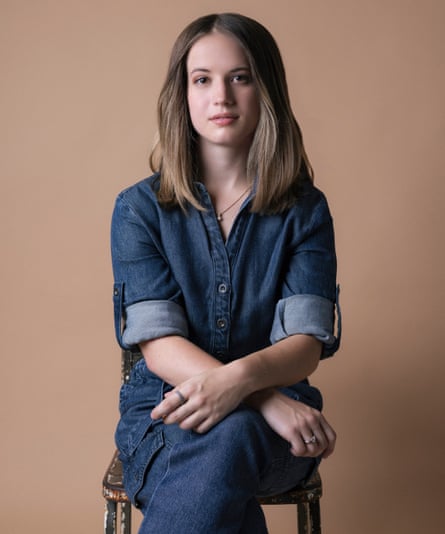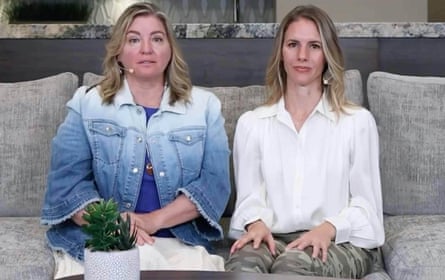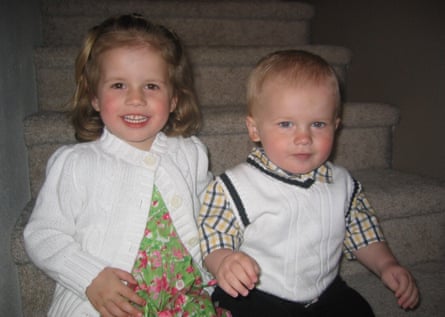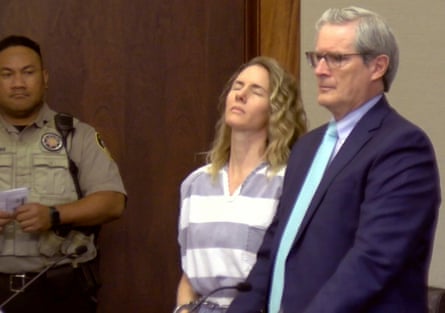
The video doorbell footage is blurry, but you can make out the young boy approaching. He has blond hair, his legs are alarmingly skinny, duct tape is strapped to his wrists and ankles, and he is shoeless. In the background, the magnificent Red Mountains rise imperiously over the desert city of Ivins, Utah. The boy rings the bell. His voice is desperate. He asks the neighbour to take him to the police station. The neighbour tells him to take a seat, asks what is going on, then calls the police.
Neighbour: “I just had a 12-year-old boy show up here at my front door asking for help and he said he just came from a neighbour’s house. He’s emaciated. He’s got tape around his legs. He’s hungry and he’s thirsty.” The neighbour, a stranger, is so upset that he starts to cry. He says it’s obvious that the boy has been held against his will and has been hurt.
Operator: “Do you know his mom’s name?”
Neighbour: “Ruby Franke is his mom’s name.”
Ruby Franke was a hugely successful influencer in the US. More than two million people followed her YouTube channel, 8 Passengers, launched in 2015. The title refers to her six children, her husband, Kevin, and of course herself, the star of the show. It followed the family’s life. We saw the children growing up under their mother and father’s influence – their mother’s primarily. Ruby was glamorous, old-fashioned and a devout follower of the Church of Jesus Christ of Latter-day Saints (LDS), AKA the Mormons.
She became one of the best-known momfluencers – mothers who show other parents how to bring up their children. Ruby’s cocktail of tough love and conservatism appeared to have produced a crop of gorgeous, smart, lovable kids. She was a role model for so many parents – until it emerged she abused her own children. Last February, she and her co-defendant, Jodi Hildebrandt, pleaded guilty to four counts of aggravated child abuse.
Now her oldest daughter, Shari Franke, has published a book about her disturbing childhood. The House of My Mother is a beautifully written horror story. It’s hard to believe Franke is only 21 – partly because she has experienced so much abuse in her short life and partly because she writes with compelling maturity. She tells me she initially thought she was too young to write a memoir because she had barely started out on her life. But she soon realised that she’s already lived through more than many of us would in a lifetime.
Shari was 11 years old and had five younger siblings when her mother launched 8 Passengers. Ruby originally posted five days a week at 6am, and the popularity of the channel quickly grew. Shari says her mother was a narcissist, who believed all the good things people said about her and ignored the bad.
Even before this, Shari had learned she had to adapt to her mother’s moods. “Anything less than unbridled enthusiasm would trigger Ruby into a rage. One hint of displeasure on my face, and whack! … But no matter how much I twisted and turned, no matter how much I achieved or accomplished, it would never be enough. There would always be some new hoop to jump through, some new standard to meet,” she writes. Ruby would smack her arms, pull her hair and apply painful flicks to her lips. Shari thought this was normal parenting until she told others about it years later.
Was there a good side to Ruby? Well, everything is relative, Shari says, but Ruby was at her best when performing in front of the camera for 8 Passengers. The fake Ruby Franke was the best version of Ruby Franke. “The nice side was shown on YouTube. That was the nicest version of Ruby I ever saw. I soon learned that if I was going to ask for something, I better do it when she’s filming, because she wants to be shown as a nice mom and wants people to like her, so if I ask for a shopping trip she’ll agree to pay for it as long as she can film it. The nice version of her was the most staged one, the most manufactured.”
Shari, pronounced Sherry, says the early days of 8 Passengers also provided some of her happiest childhood memories. “When the YouTube channel started it was really cool to get lots of vacations and free stuff like clothing or makeup. It was a way I got friends at school; people just wanted to talk to me. I got lots of likes on my Instagram posts, and as a teenager that meant a lot to me. Disney World paid for us to go there for free and they opened the park for us. I felt special, and it was fun.” In a world in which we’re measured by our following on social media and the designer labels we wear, what was there not to like?
At 15, Shari launched her own YouTube channel. She asked Ruby if she would give her a shout-out on 8 Passengers to help her get some followers, but her mother gave her short shrift. Ruby had done everything without support, so why should it be any different for Shari? It was perfectly consistent with her philosophy of tough but fair parenting. She told Shari she never gave a shout-out to anyone with fewer than 100,000 followers, and she should ask again when she hit that mark.
In the meantime, 8 Passengers continued to grow its audience – one million subscribers, two million and, at its peak in 2020, just short of 2.3 million. Shari’s YouTube channel was also successful. And, sure enough, when she turned 15 and reached 100,000 subscribers, Ruby gave her the promised shout-out. She also told Shari, in private, that she was taking 10% of her income in “management fees”. By now the mood had changed. All the fun had gone out of it. While Ruby told the world she was all about the mothering, Shari says their relationship had become entirely corporate. Ruby would pay her to take part in films – $10 here, $100 there, if Shari wasn’t keen but Ruby was convinced it would go viral. “It was like a business. She was the CEO and I was the employee.” But even here she appears to have been wholly exploited. When Ruby was promoting eyebrow waxing strips, she said she’d pay Shari $100 to be her guinea pig. Her mother butchered her left eyebrow, and failed to pay the $100. The video, titled “Shari, I’m so sorry”, got hundreds of thousands of views.
Shari began to question the videos they were making and why her mother would pay her more to make films about certain subjects. Early on, she says, she was happy to be in a film about bra shopping, but didn’t have a clue about long-term consequences. “At the time I thought, great, I’ll do that. But then when I got older, it’s like, oh, that’s now on the internet for ever. Going bra shopping with my younger sisters when I was 18 and Ruby was filming that, I thought, this is super weird, I don’t want people online to be watching my sisters buying bras.”
It’s strange, I say, that your mother was so conservative, yet keen to film you bra shopping. She nods and says it was all about the money. “Those personal videos did the best. People like to see first date or puberty talk videos.” The older she became, the more Shari thought about the issue of consent. Even when it had been fun early on, she says, she was neither old nor wise enough to give informed consent. Looking back, she realises she also exploited her siblings on her own YouTube channel, where she posted twice weekly. She followed Ruby’s blueprint, making videos about sensitive subjects such as shaving and periods because that’s where the views were.
Today, Shari spends much of her time campaigning for family vlogging to be banned. Whatever protections are put in place, there is no way it can’t be exploitative, she says. While it is legal, she begs the public to stop watching. “We wouldn’t need to ban family vlogging if people just stopped watching it. I don’t understand why people like to watch it. I think it’s strange.” Occasionally, she sounds as young as her years.
When she was a little girl, Shari’s father, Kevin Franke, was the undisputed head of the household. Shari describes Kevin, a professor of civil engineering who specialised in the study of earthquakes, as the family’s “intellectual powerhouse”. For Ruby, the most important thing was to be a good wife and mother. She believed that was the role of a woman – to serve her children and husband.
But when Ruby started to make big bucks, the power dynamic changed. Kevin retreated into the background as Ruby took over. Like the six children, he quietly went along with her plans and his passivity ultimately proved catastrophic, enabling Ruby to abuse her children in plain sight. The irony, Shari says, is that, professionally, Kevin was dedicated to making the world a safer place, yet in private he watched on silently as all the norms and protections of traditional family life were trampled on by his wife. In The House of My Mother, Shari describes how their existence revolved around satisfying Ruby’s ambition and placating her anger. “It was as if we had taken the most poisonous plant in our garden and, instead of uprooting it, made it the centerpiece of our lives,” she writes.
The more praise Ruby got from viewers, the more messianic she became. Many of the subscribers were themselves damaged, and they viewed the Frankes, and Ruby in particular, as a surrogate family. They would leave messages such as, “You’re like my siblings. I know everything about you”, “Wow, thank you for showing the tough side of parenting” and, “Watching your family, it’s like I finally found a place where I belong.” One message said, “You guys are so happy and loving and above all HONEST, it gives me hope maybe one day I can have that, too. I’ve even started going to church because of you, and I’m thinking about getting baptised in the LDS church. Thank you for showing me the light.”

The family traded in their old minivan for what Shari describes as a “gleaming Chevy behemoth” with the licence plate 8PSNGRS, which became “a rolling billboard for our commodified family life”. As they cruised down the freeway, excited families would wave to them from their cars.
All the affirmation left Shari uneasy, but it further convinced Ruby of her righteousness. She would tell Shari they were making a difference to people; showing them how to live a good life. When Shari was in eighth grade, aged 14, she took a course in mental health. It was only then that she understood she was suffering from severe depression. She was overwhelmed by a sense of self-loathing and hopelessness. Sometimes she felt so bad, she wanted to end it all. She told Kevin, who was sympathetic and suggested to Ruby that Shari would benefit from therapy. Ruby scoffed and said she just needed to sleep longer, eat better and exercise more.
By now the second oldest of the children, Chad, had become disruptive and was expelled from his zero-tolerance Mormon school. In 2018, the family went on a trip to Universal Studios in Hollywood – effectively a free holiday, and an opportunity to promote a brand of wet wipe by filming themselves making a mess and cleaning it up. Chad was so badly behaved that Ruby banished him to the hotel room while the rest of the family enjoyed themselves. He then sneaked out of the hotel, talked his way back into Universal Studios and had a great time by himself. It was all too much for Ruby, who decided Chad needed an even tougher influence than herself to temper his behaviour. This is when Jodi Hildebrandt came on to the scene.
Jodi was a mental health counsellor who ran a life-coaching programme called ConneXions. She had a reputation in Utah’s LDS community for turning around the lives of those believed to be on the wrong path. ConneXions claimed it could overcome everything from the specific (porn addiction) to the abstract (the Orwellian sounding “distorted thinking”). Its guiding principles were impeccable honesty, vulnerable humility and rigorous personal responsibility. Jodi was successful, self-made and of the faith. She was also a monster.
Jodi was hired first to work on Chad, then Shari. From the off, everything about her worried Shari. Jodi admitted to being more comfortable with animals than humans and was disturbed by the sight of tenderness between parents and children, yet she was here to “fix” the Franke family. Her $5m home in Ivins, an idyllic desert city with a tiny population of about 9,000, was testament to the popularity of her people-fixing techniques. (Her seven-week course teaching Chad survival skills in the desert cost $13,945.) It later emerged that Jodi’s licence had been temporarily suspended in 2012 after she disclosed a patient’s “porn addiction” to his church leaders.
After becoming a paid-up member of ConneXions, Ruby went further. She became Jodi’s accomplice and invited her to live with the family in their house, turfing Chad out of his bedroom to make space for her. Before long, Jodi appeared to have taken over. Although she and Ruby loudly disapproved of homosexuality, because it contravened church teachings, they had started a clandestine sexual relationship. When Shari left home to go to university, the couple moved into her bedroom.

Random new rules and practices were introduced to family life. One day in December, Ruby and Jodi called the children down to tell them the two youngest would not get Christmas presents that year while everybody else would. This was to teach them not to be selfish and entitled, they explained. Kevin nodded along in silence.
When Shari said that in that case it would be wrong for anybody in the family to have presents, she was told her mindset would cause the children to suffer in later life. That day Jodi also announced that the two youngest children must ask permission before speaking to their elders and be reprimanded if they interrupted. “We all need to present a united front to correct their behaviour,” she said. On Christmas Day, the two youngest children watched the others open their presents, then were ordered to clean up the mess from the wrapping paper.
After Shari had left for university, she returned home one day unannounced to collect a book. Kevin told her she couldn’t go into her bedroom because Ruby and Jodi were in there and she would have to text her mother for permission in advance.
But no matter what happened behind closed doors, 8 Passengers continued to flourish. Until, in May 2020, Chad casually mentioned in an episode entitled What We Haven’t Told You that he had been sleeping on a beanbag on the basement floor for seven months because his bedroom privileges had been removed for continued defiance. Ruby thought nothing of it. It was just another example of tough but fair parenting – something subscribers would approve of and be grateful to have been told. She couldn’t have been more wrong. There was an outpouring of shock and revulsion. This wasn’t tough parenting, it was child cruelty, viewers said. “That video burned down the 8 Passengers YouTube channel overnight and cost our family 90% of our income,” Shari writes in her memoir. “Hundreds of thousands unsubscribed and brands, once eager to associate with our wholesome family image, couldn’t distance themselves fast enough. Overnight, we went from wholesome family influencers to social media pariahs.”
A year later, in May 2021, Shari met Derek (not his real name), a family man in his late 40s, a church elder and respected member of the community. He asked her to help with social media strategy and creating YouTube videos. Derek was kind and gentle. She soon found herself confiding in him about her home life. But the kindness quickly turned into something else. He started to buy Shari gifts and told her he was the only one who truly cared about her.
after newsletter promotion
Things became physical. “He said he was training me for marriage,” she writes in the book. “Showing me things I would need to do in order to please my future husband … ‘Your husband is going to be disappointed on your wedding night if you are uncomfortable being touched like this,’ he’d say.” When she told him it was wrong, he tried to persuade her otherwise, using his status as a church elder to reassure her there was nothing inappropriate about his behaviour. She became terrified of him. On one occasion, Shari claims, he told her she needed to learn how to defend herself against potential assailants and suggested he turn up at her university in disguise and attack her to make sure she was prepared for such an event. “Just like Ruby and Jodi, he was yet another one of the poisonous adults in my life, sucking the very marrow from my bones,” she writes.
It sounds terrifying, I say. She nods. “Yes, when I went to therapy I found myself thinking more about Derek than what had happened with Ruby and Jodi. I realised I was dealing with post-traumatic stress disorder and the paranoia of constantly looking over my shoulder, thinking he was going to come and find me, and attack me and kill me. So in a way writing it in a book and sharing it with the whole world takes power away from that. I’m calling him out and getting rid of that guilt and shame I carried because of it.” And you did think he could kill you? “Yeah. Yeah.” Silence.
When she reported Derek to the church leaders, she was told that they could do nothing because she was 18 and no longer a minor. In fact, it was Shari who went on to be punished, with the removal of her “temple recommend”, which permits entrance into any of the LDS temples around the world. Eventually, she says, Derek was brought before a formal disciplinary council and stripped of his position. She had been to the police about him, she says, but he was never charged. (The LDS did not respond to our requests for a comment about Derek.)

Throughout this time, Shari’s family continued to disintegrate. Her memoir is so unremittingly bleak, the reader is desperate for one chink of light to break through the darkness. This comes in the form of her former teacher, Mr Haymond, and his wife who respected her confidences and supported her through the most terrible times. One day she found herself sitting in the Haymonds’ living room and asking, “May I call you Mom and Dad?” It’s a tender moment in her story. “Mrs Haymond’s face lit up like a Christmas tree, her eyes glistening,” Shari writes. “‘Oh, sweetheart,’ she breathed, pulling me into a tight hug that nearly crushed my ribcage. ‘Of course you can. I would be honored for you to call me Mom.’” The Haymonds are still Mom and Dad to Shari.
Throughout the book she never refers to Ruby or Kevin as Mom and Dad. Initially, I assume it simply reflects a surprising informality. Eventually, I realise it’s her way of reframing their relationship. “I battled so hard with the commandment to honour your mother and father,” she tells me. “So I decided to call them Ruby and Kevin rather than dishonour my mother and father. I’ll always call her Ruby. She’ll never be Mom to me. But as Kevin and I are building back our relationship, Dad will slip in every once in a while.”
In July 2022 Kevin rang Shari to tell her that Ruby had “invited” him to leave the family home so he could work on himself. “Once I’m better, I’ll come back, and we can be a happy family again. I’ll be gone for at least a year,” he told her. He then said Chad had also been invited to leave because of his selfishness. The next day Kevin texted Shari to tell her not to contact him or Chad until they reached out to her; that it would be selfish to do so. “Use this time to get close to your mom and your siblings,” he said.
I ask Shari if she thinks Kevin’s passivity ended up being another form of abuse. She struggles for a simple answer, but there is none. “He doesn’t have a malicious bone in his body and I have really good memories with him. I think he was emotionally abused and trampled on by Ruby throughout their marriage. Objectively he was neglectful of the kids and of me. But I don’t think people understand that till they have been in a cult or in ConneXions. He did everything for a good intention. He had pure motives. I do not excuse what he did, but he has been very apologetic. He has taken responsibility for it in a way that Ruby, Jodi and Derek haven’t done.”
Shortly after Kevin and Chad left the family home, a neighbour got in touch with Shari to say that the four remaining children had been left alone for five days while Ruby and Jodi had gone away. That was when Shari called the Department of Children and Family Services, requesting a welfare check on the children. The police went around to the family home, knocked on the door, looked through the windows, and reported that the kids seemed fine. They took no further action.
It didn’t take long for Ruby and Jodi to discover Shari had reported them. What you did was heroic, I say. For once, she stumbles over her words. “Yes. I … ” She starts again. “Obviously my brother’s the hero in the story, but I’d like to think I did what I could.”
One of the many shocking things about Shari Franke’s story is that it’s all so recent. The repercussions are still playing out in front of us. It’s only three years since Shari met Derek, two since Kevin was “invited” to leave the house, and 17 months since her distraught 12-year-old brother turned up at the neighbour’s house begging to be rescued.
When the police searched Jodi’s house, where the couple were staying, they discovered Shari’s traumatised nine-year-old sister sitting cross-legged in a darkened closet. For hours she wouldn’t move or talk to them. Although the two children were living in the same house, it emerged that they had been kept apart and hadn’t seen each other for a month. The girl showed similar signs of malnutrition and neglect to the boy.
Ruby and Jodi were arrested, and Kevin was later taken in for questioning by the police. He said he was separated from his wife because “I have some problems”, had not seen the children for over a year and was shocked when told about the conditions in which they had been found. He was released without charge.

At the trial of Ruby and Jodi last February, it emerged that the children had been starved, beaten and tied up with rope. They were forced to stand on hot concrete in the summer heat for hours at a time, made to sleep on hard floors and sometimes locked in a concrete bunker in Jodi’s basement. Open wounds were treated with cayenne pepper and honey. The injuries were so severe that the children required hospitalisation. Eric Clarke, the Washington County attorney, said during the sentencing hearing, “Had the older of the children not had the courage to run away and ask a neighbour to call the police, heaven only knows how much longer he could have survived in that situation.”
Ruby gave evidence against Jodi, who was described as her former business partner. She wept, apologised to her children and blamed Jodi’s malign influence. “For the past four years, I’ve chosen to follow counsel and guidance that has led me into a dark delusion,” she said. “My distorted version of reality went largely unchecked as I would isolate from anyone who challenged me.”
Both women were sentenced to one to 15 years in prison for each of the four counts of aggravated abuse they pleaded guilty to, to be served consecutively with a maximum of 30 years. A few months earlier, in November 2023, Kevin Franke filed for divorce, and he later sued Jodi Hildebrandt over the child abuse of his children and the ruin of their family.
Shari does not believe her mother has shown true remorse or taken responsibility for her crimes. She suggests in focusing on Jodi’s influence, she was trying to convince the court and her family that she was also a victim of her cult. It’s not true, though, Shari says: Ruby’s behaviour didn’t change in type over the years, only in degree. “Looking back at the warning signs and how things built up, I can see how it ended up as extreme as it got. The two of them together were the worst possible combination and brought out the worst in each other.”
When I mention the malnutrition and open sores on her brother’s legs, Shari winces. “I don’t know fully what happened. I choose not to read about it or look at it, so in a way the world knows more about what happened to them than I do.” It could have been so much worse, I say. “I’m glad things ended when they did,” she says, and comes to a terse, emotional stop. “I don’t think it could have gone on much longer.”
Although Ruby could be kept in jail for 30 years, she could also be released in less than three. How long would Shari like to see her serve? “I’d like her to be in the maximum amount of time possible. That’s obviously up to the Parole Board. I’ll do what I can to make sure she stays in prison. I don’t plan to see her again. Ever.”
It’s a ghastly story, but Shari believes it is also a salutary one. In The House of My Mother, she sums up in a single paragraph the significance of the Franke family story and why the public remains so fascinated with it. “Who knew that in the age of viral scandals and cancel culture, it would be the wholesome, family-centered content of LDS vloggers that would capture the world’s attention? And who could have foreseen that my own family would come to embody both – the wholesome ideal and the scandalous – becoming a cautionary tale of what happens when the line between authenticity and performance becomes blurred beyond recognition?”
I ask how her siblings are doing. She answers with remarkable equanimity. “They’re all healing in their own ways and in their own time. As a family, we’re all doing our own part and trying to heal.”
As for Shari herself, she says she is doing extremely well, considering. She recently announced her engagement on Instagram, and in doing so said that would be the last time she reveals anything about her private life in public. “I’ve had my voice and agency taken for so long and now I’m putting my foot down. I’m not going to talk about my wedding, future husband or future kids,” she posted. “I’ll continue to advocate for kids who don’t have a voice (so you’ll still be seeing me, don’t worry) but this is closure for me. I’m moving on with my life and that’s true freedom and joy. Please respect my privacy and the privacy of my future family and don’t speculate or pry.” All she will tell me about her fiance is that he is a member of the church – as she still is, too – and that he comes from a good family.
I ask Shari if she has nightmares. “I have dreams that Ruby is out of prison and back in our family. I’m sure those will always be there, but I’m getting better.”
Shari says she is hoping that the rest of her life will be far less remarkable than her childhood. The less we hear of her in future, she says, the more successful she will have been. “I like to think I’m getting all my hard trials in life over at the front end. I’m only 21 and already all of this has happened. Now I’d like a regular job, off social media, and a regular family. That’s my goal.” She smiles at the dreamy prospect of everyday dullness. “I would like a boring life, yes.”










 English (US)
English (US)